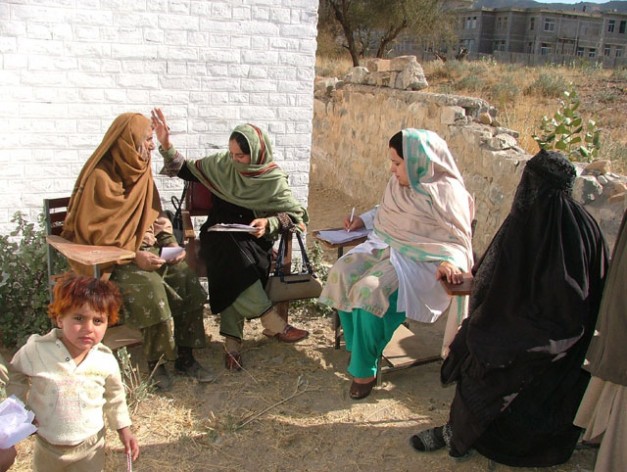By Ashfaq Yusufzai | (Inter Press Service) | – –
PESHAWAR, Pakistan, Nov 26 2015 (IPS) – “My two sons were killed by Taliban militants mercilessly three years ago. My husband died a natural death two year back. Now, I am begging to raise my two grandsons,” Gul Pari, 50, told IPS.
Pari, who is waiting for her turn at a psychiatrist’s clinic in Peshawar, the capital of the Khyber Pakhtunkhwa, says she dreamed every night that her sons were alive and would return one day.

Women being examined by female doctors in free medical camp held in North Waziristan, one of the seven districts of FATA. Credit: Ashfaq Yusufzai/IPS
“I am waiting for them. They are martyrs and will come and take revenge from their killers,” she said.
While psychiatrist Dr Mian Iftikhar Hussain said that a majority of the women from the Federally Administered Tribal Areas (FATA) suffer from psychological problems due to endless violence by Taliban militants.
“We have been receiving at least 200 people, mainly women, with post-traumatic stress disorders due to the human and financial losses.
FATA comprises seven districts, is home to 6 million people and has suffered immensely due to endless conflict,” he said.
Federally Administered Tribal Areas located on the border with Afghanistan is thick with militants since 2001 when the U.S.-led coalition forces toppled their government in Kabul in the wake of the 9/11 attacks in New York and Washington.
They took refuge in FATA from where they began targeting Pakistani forces, damaging schools and other government-owned buildings.
Towards the end of 2005, Pakistan, a U.S. ally in the war against terrorism, began military operation which displaced at least 3million people.
“Most of the displaced people have developed psychological problems because they have lost their near and dear ones in war between Taliban and the army, besides losing their trades, shops and agricultural productivity,” Mian Iftikhar Hussain said.
FATA near Khyber Pakhtunkhwa, one of Pakistan’s four provinces, has suffered immensely.
Muhammad Rafiq, a shopkeeper in North Waziristan, one of FATA’s districts told IPS that his daughter developed mental problems due to displacement. “We now live in a mud-built house which is without clean drinking water and sanitation facilities. There is no electricity, which makes my children face health problems,” he said.
Rafiq said he had better house back home and had earned an appropriate amount to lead prosperous lives but now they have become extremely poor and couldn’t get proper food.
Prof Syed Muhammad Sultan head of the psychiatry department at the Khyber Teaching Hospital Peshawar warns that residents of FATA would face more mental and psychological problems in the days ahead.
Most of the displaced population has taken temporary shelter in the Khyber Pakhtunkhwa province in tiny houses or schools where they lacked basic amenities.
Women and children are vulnerable to psychological conditions, he said.
“They are destined to develop short as well as long term psychological disorders in addition to physical problems,” he said.
Most of the displaced persons have developed the problems of de-personalisation, a condition in which people feel change in their personalities, as well as de-realisation, a condition in which people feel a complete change in the other people’s personalities, he explained.
Professor Sultan said the burden of psychological disorders is unseen but it could go out of proportion if attention is not paid to control it early.
“Women are the worst victims of this mass displacement, which is likely to cause them anxiety disorders, panic disorders, mixed anxiety depression disorder and depression,” he said.
Psychologist Zeenat Shah said many displaced persons suffered from poor self-esteem as well as insecurity about future, while grief and bereavement were other issues faced by them.
“The people who have to flee homes, struggle to adjust to new environments and have a sense of insecurity. This is the result of loss of social structure as well as deaths of close relatives in the conflict and will cause permanent phobias, chronic depression and adjustment problems among displaced people,” she said.
Another psychologist has voiced concern about the mental health of displaced women and children.
“From childhood to adolescence, a child passes through a lot of dramatic changes in physical as well as mental health. During the transition, they gain their identity, grow physically and establish social interaction and relationship in home, in community and in society as whole,” she said.
The psychologist said children going through through the psychological ordeals as in FATA couldn’t progress academically.
She said the situation with regard to women would deteriorate if they (women) continued to stay in the conditions which they were currently in.
“Such women have to live in host communities with relatives or in small rented houses most of which don’t have proper water, electricity and sanitation system. It is very difficult for them to work and cook in the current fasting month in this hot weather, especially when they don’t have access to basic amenities,” she said.
Zainab Bibi, another psychologist from the hospital, has seen the situation as critical for the Waziristan people.
“They (the displaced) have left their homes in a hurry to save their lives. They are victims of decade-long war in their native areas.,” she said.
“It will be very difficult for them to face challenges. However, they could overcome some of them with the help of the government and welfare societies as well as relatives,” she said.
The incidence of psychiatric disorders among displaced persons would soar due to the protracted life difficulties.
Interventions like educational and recreational facilities for the displaced to help them fight mental health problems could help alleviate the problem, she suggested.
Licensed from Inter Press Service



 © 2025 All Rights Reserved
© 2025 All Rights Reserved